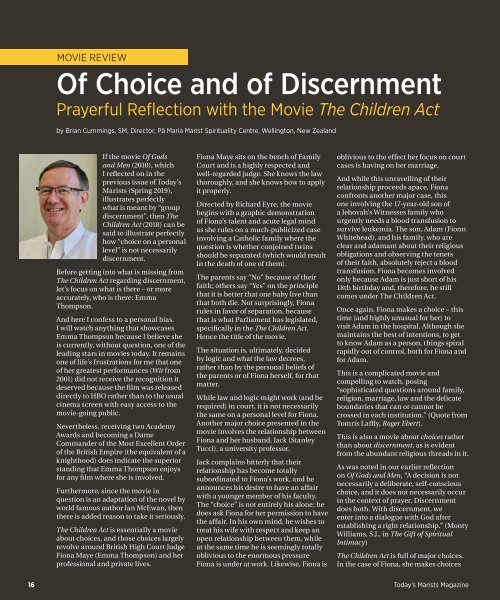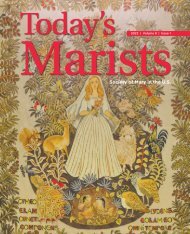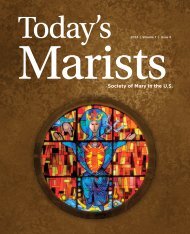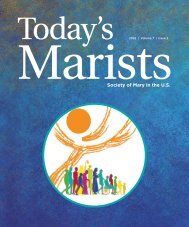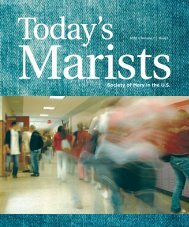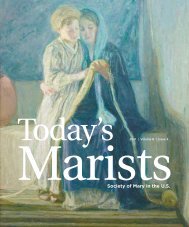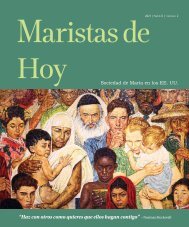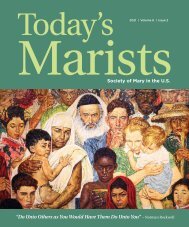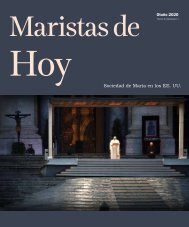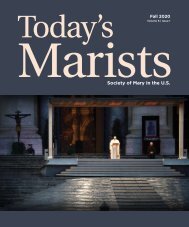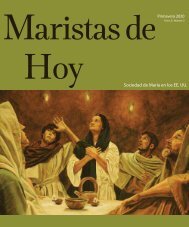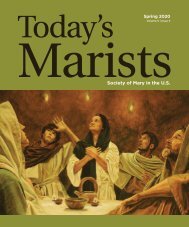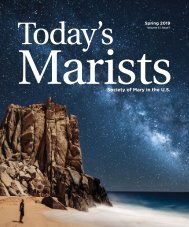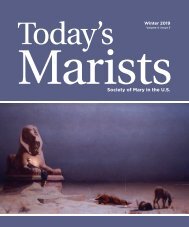Today's Marists V.5 Issue 2 FALL 2019
Create successful ePaper yourself
Turn your PDF publications into a flip-book with our unique Google optimized e-Paper software.
MOVIE REVIEW<br />
Of Choice and of Discernment<br />
Prayerful Reflection with the Movie The Children Act<br />
by Brian Cummings, SM, Director, Pā Maria Marist Spirituality Centre, Wellington, New Zealand<br />
If the movie Of Gods<br />
and Men (2010), which<br />
I reflected on in the<br />
previous issue of Today’s<br />
<strong>Marists</strong> (Spring <strong>2019</strong>),<br />
illustrates perfectly<br />
what is meant by “group<br />
discernment”, then The<br />
Children Act (2018) can be<br />
said to illustrate perfectly<br />
how “choice on a personal<br />
level” is not necessarily<br />
discernment.<br />
Before getting into what is missing from<br />
The Children Act regarding discernment,<br />
let’s focus on what is there – or more<br />
accurately, who is there: Emma<br />
Thompson.<br />
And here I confess to a personal bias.<br />
I will watch anything that showcases<br />
Emma Thompson because I believe she<br />
is currently, without question, one of the<br />
leading stars in movies today. It remains<br />
one of life’s frustrations for me that one<br />
of her greatest performances (Wit from<br />
2001) did not receive the recognition it<br />
deserved because the film was released<br />
directly to HBO rather than to the usual<br />
cinema screen with easy access to the<br />
movie-going public.<br />
Nevertheless, receiving two Academy<br />
Awards and becoming a Dame<br />
Commander of the Most Excellent Order<br />
of the British Empire (the equivalent of a<br />
knighthood) does indicate the superior<br />
standing that Emma Thompson enjoys<br />
for any film where she is involved.<br />
Furthermore, since the movie in<br />
question is an adaptation of the novel by<br />
world famous author Ian McEwan, then<br />
there is added reason to take it seriously.<br />
The Children Act is essentially a movie<br />
about choices, and those choices largely<br />
revolve around British High Court Judge<br />
Fiona Maye (Emma Thompson) and her<br />
professional and private lives.<br />
Fiona Maye sits on the bench of Family<br />
Court and is a highly respected and<br />
well-regarded judge. She knows the law<br />
thoroughly, and she knows how to apply<br />
it properly.<br />
Directed by Richard Eyre, the movie<br />
begins with a graphic demonstration<br />
of Fiona’s talent and acute legal mind<br />
as she rules on a much-publicized case<br />
involving a Catholic family where the<br />
question is whether conjoined twins<br />
should be separated (which would result<br />
in the death of one of them).<br />
The parents say “No” because of their<br />
faith; others say “Yes” on the principle<br />
that it is better that one baby live than<br />
that both die. Not surprisingly, Fiona<br />
rules in favor of separation, because<br />
that is what Parliament has legislated,<br />
specifically in the The Children Act.<br />
Hence the title of the movie.<br />
The situation is, ultimately, decided<br />
by logic and what the law decrees,<br />
rather than by the personal beliefs of<br />
the parents or of Fiona herself, for that<br />
matter.<br />
While law and logic might work (and be<br />
required) in court, it is not necessarily<br />
the same on a personal level for Fiona.<br />
Another major choice presented in the<br />
movie involves the relationship between<br />
Fiona and her husband, Jack (Stanley<br />
Tucci), a university professor.<br />
Jack complains bitterly that their<br />
relationship has become totally<br />
subordinated to Fiona’s work, and he<br />
announces his desire to have an affair<br />
with a younger member of his faculty.<br />
The “choice” is not entirely his alone; he<br />
does ask Fiona for her permission to have<br />
the affair. In his own mind, he wishes to<br />
treat his wife with respect and keep an<br />
open relationship between them, while<br />
at the same time he is seemingly totally<br />
oblivious to the enormous pressure<br />
Fiona is under at work. Likewise, Fiona is<br />
oblivious to the effect her focus on court<br />
cases is having on her marriage.<br />
And while this unravelling of their<br />
relationship proceeds apace, Fiona<br />
confronts another major case, this<br />
one involving the 17-year-old son of<br />
a Jehovah’s Witnesses family who<br />
urgently needs a blood transfusion to<br />
survive leukemia. The son, Adam (Fionn<br />
Whitehead), and his family, who are<br />
clear and adamant about their religious<br />
obligations and observing the tenets<br />
of their faith, absolutely reject a blood<br />
transfusion. Fiona becomes involved<br />
only because Adam is just short of his<br />
18th birthday and, therefore, he still<br />
comes under The Children Act.<br />
Once again, Fiona makes a choice – this<br />
time (and highly unusual for her) to<br />
visit Adam in the hospital. Although she<br />
maintains the best of intentions, to get<br />
to know Adam as a person, things spiral<br />
rapidly out of control, both for Fiona and<br />
for Adam.<br />
This is a complicated movie and<br />
compelling to watch, posing<br />
“sophisticated questions around family,<br />
religion, marriage, law and the delicate<br />
boundaries that can or cannot be<br />
crossed in each institution.” (Quote from<br />
Tomris Laffly, Roger Ebert).<br />
This is also a movie about choices rather<br />
than about discernment, as is evident<br />
from the abundant religious threads in it.<br />
As was noted in our earlier reflection<br />
on Of Gods and Men, “A decision is not<br />
necessarily a deliberate, self-conscious<br />
choice, and it does not necessarily occur<br />
in the context of prayer. Discernment<br />
does both. With discernment, we<br />
enter into a dialogue with God after<br />
establishing a right relationship.” (Monty<br />
Williams, S.J., in The Gift of Spiritual<br />
Intimacy)<br />
The Children Act is full of major choices.<br />
In the case of Fiona, she makes choices<br />
16 Today’s <strong>Marists</strong> Magazine


